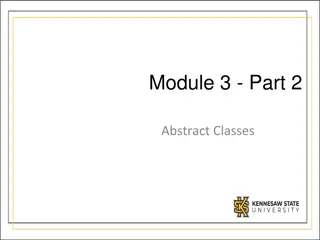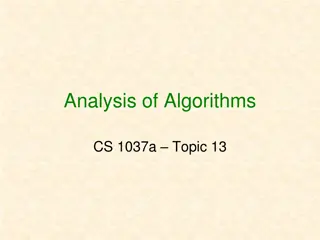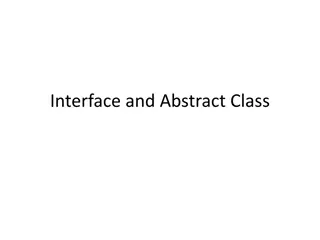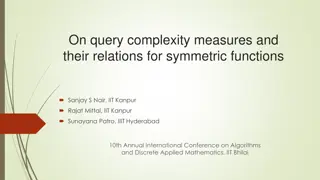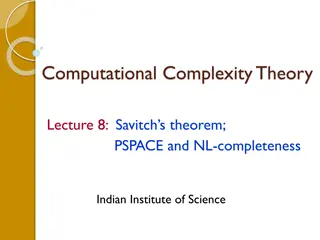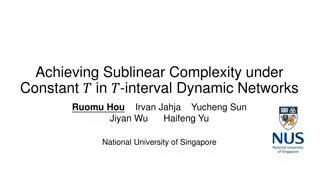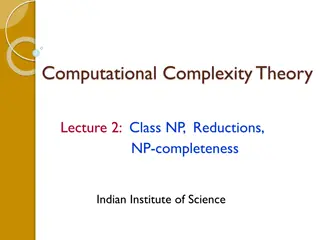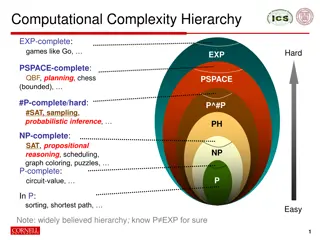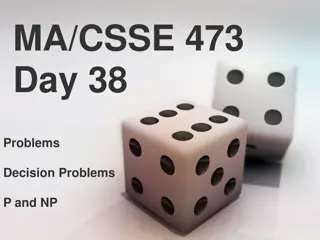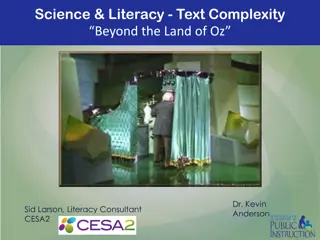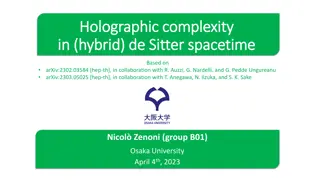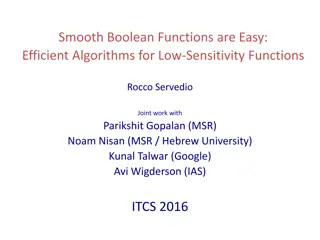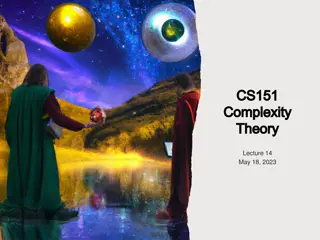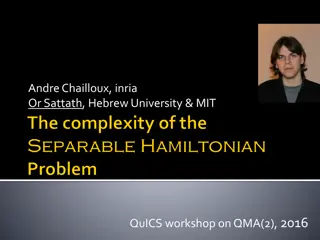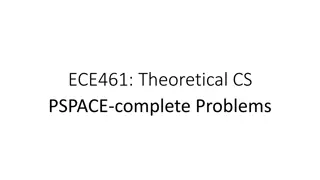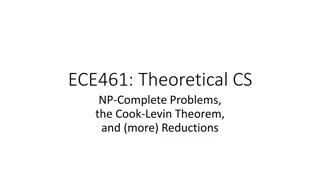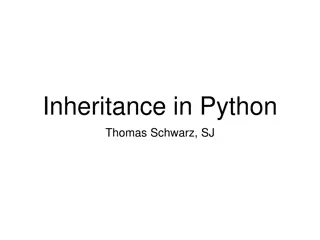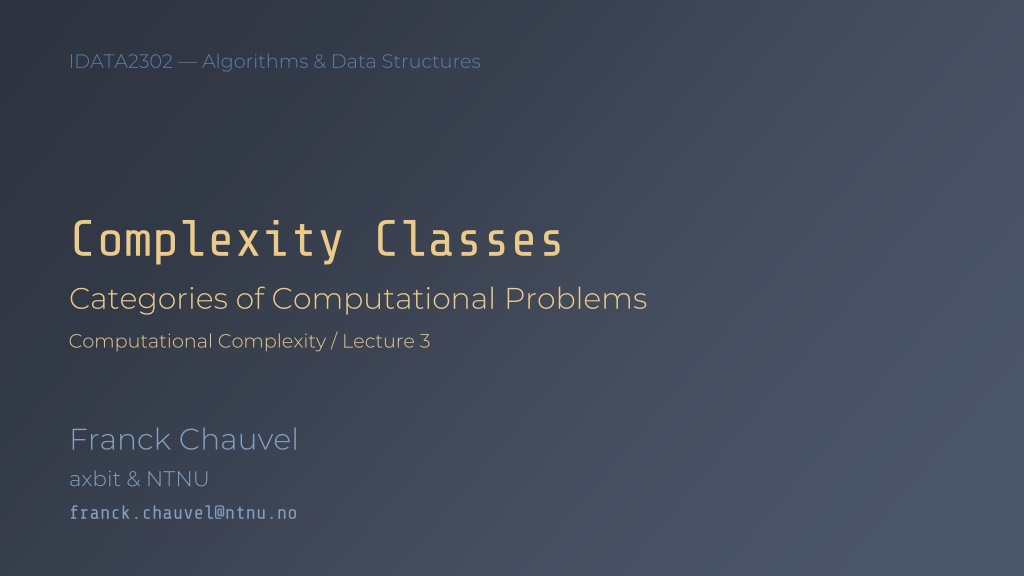
Computational Complexity and Decision Problems Overview
Explore the world of computational complexity, decision problems, and algorithm efficiency with insights into various complexity classes and computational models. Understand how decision problems can be framed as yes or no questions and delve into examples like the Traveling Salesperson Problem. Discover the relationship between decision problems and languages, as well as different computation models like Turing machines and automata.
Download Presentation

Please find below an Image/Link to download the presentation.
The content on the website is provided AS IS for your information and personal use only. It may not be sold, licensed, or shared on other websites without obtaining consent from the author. If you encounter any issues during the download, it is possible that the publisher has removed the file from their server.
You are allowed to download the files provided on this website for personal or commercial use, subject to the condition that they are used lawfully. All files are the property of their respective owners.
The content on the website is provided AS IS for your information and personal use only. It may not be sold, licensed, or shared on other websites without obtaining consent from the author.
E N D
Presentation Transcript
IDATA2302 Algorithms & Data Structures Complexity Classes Categories of Computational Problems Computational Complexity / Lecture 3 Franck Chauvel axbit & NTNU franck.chauvel@ntnu.no
Remember Problems Algorithms Programs Algorithm 1 ? ?,? = ? ? efficiency Algorithm 2 2
Agenda 1. Decision Problems 2. Computation Models 3. Complexity Classes: P, NP, EXP 4. NP-Completeness & Reductions 3
Decision Problems Inputs Every computational problem can be rephrased as a decision problem Decision Problem Yes No 4
Traveling Salesperson Problem (TSP) An example Given a graph of cities, find a tour that visits each city exactly once and returns to the starting city. Verifying Solving Given a graph of cities and a tour, does it visit each city exactly once and returns to the starting city? Given a graph of cities, is there a tour that visits each city exactly once and returns to the starting city? 5
Decision Problems as Languages Every decision problem can be viewed as checking whether a word belongs to a given language Is franckc@ntnu.no a valid email? Does the graph ? = (?,?) admits a hamiltonian tour? 6
Languages and Computation Models Computation Model Languages Regular Expression Finite Automata Context-free Languages Pushdown Automata Context-senstive Languages Linear-bound Automata Recursively enumerable Turing Machine Languages More computational power 8
Computation Models Abstract Machines Functional Models RAM Turing machine Lambda Calculus Pushdown Automata Combinatory Calculus DFA Rewriting Systems Concurrent Model Actors Celullar Automata Petri Nets 10
Turing Machine: ? = (?,?0,?,,?) input tape (symbols) ?:? ?3 ? ?2 ?,?,?3 Automaton ?? ?1 ?0 scratch pad tape (symbols) output tape (symbols) 11
Turing-Completeness We don t know anything more powerful than a Turing machine RAM, Lambda-calculus, Actors, etc. are all turing-complete A computation model is turing-complete, if it can emulate a Turing machine 12
Computable Functions Can we solve every problem? Only, those that can be solved with a Turing-machine (Church-Turing Thesis) Example: the halting problem 13
Non-Deterministic Turing Machine A non-deterministic machine always picks the right branch 14
Efficiency Given a problem, some computation models are faster" than a Turing machine but never more powerful than a Turing Machine 15
Playing Sudoku With a non-deterministic Turing Machine Easy ! ? ?2 Just guess right every cell! 16
Complexity Class Complexity Class (set of decision problems) Computation Model (TM, RAM, DFA, etc.) A resource (time of space) A bound O(n) NL: The problems that can be solved by a non-deterministic turing machine in linear time 17
Common Classes Class P Solved by a deterministic turing machine in polynomial time EXPSPACE EXP Class NP: Solved by a non-deterministic Turing machine in polynomial time Problems verifiable in polynomial time by a deterministic turing machine PSPACE NP P Class EXP Solved by a deterministic turing machine in exponential time NL 18
If P = NP Non-determinism is useless Mathematicians are useless, we just need theorem provers Cryptography is just a joke We don t know yet Every hard problem has an efficient solution, yet to be found! 19
NP-Completeness A problem is NP-complete the problem is in NP at least as hard as every other problem in NP the hardest problems in NP NP-hard NP-complete A problem is NP-hard it is not in NP at least as hard as every other problem in NP harder than the hardest NP P 20
Problem Reduction It is at least as easy as Problem A Algorithm? Algorithm that converts a problem into another and conserves the correctness of solution Reduction (algorithm) ?(??) ?(??) A is at least as easy as B Problem B Algorithm 2 21
Problem Reduction It is at least as hard as Provided there is algorithm that solves B in polynomial time Problem A Algorithm Reduction (algorithm) By contradiction Suppose A is easy to solve Because there is a reduction, Can t be that easy ?(??) ?(??) Problem B Algorithm 2 B is at least as hard as A 22
Why all of that? Before to attack a problem check how hard it is 23
Recap Turing-completeness nothing beats the turing machine Show NP-completeness using reduction at least as hard/easy than Non-deterministic turing machine Perfect guesser Do not know how to build that NP-complete hard to solve / easy to verify NP-hard hard to solve / hard to verify Complexity class Resource Machine Bound P =?= NP If we solve one, we solve many 24
Thank You! Questions, Comments, or Ideas? Franck Chauvel Axbit & NTNU franck.chauvel@ntnu.no

